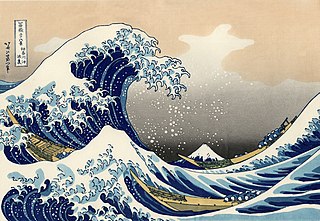
Anime is hand-drawn and computer-generated animation originating from Japan. Outside Japan and in English, anime refers specifically to animation produced in Japan. However, in Japan and Japanese, anime describes all animated works, regardless of style or origin. Many works of animation with a similar style to Japanese animation are also produced outside Japan. Video games sometimes also feature themes and art styles that can be considered as anime.

Frank Vincent Zappa was an American musician, composer, and bandleader. His work is characterized by nonconformity, free-form improvisation, sound experimentation, musical virtuosity and satire of American culture. In a career spanning more than 30 years, Zappa composed rock, pop, jazz, jazz fusion, orchestral and musique concrète works; he also produced almost all of the 60-plus albums that he released with his band the Mothers of Invention and as a solo artist. Zappa also directed feature-length films and music videos, and designed album covers. He is considered one of the most innovative and stylistically diverse musicians of his generation.

The Edo period, also known as the Tokugawa period, is the period between 1603 and 1868 in the history of Japan, when Japan was under the rule of the Tokugawa shogunate and the country's 300 regional daimyo. Emerging from the chaos of the Sengoku period, the Edo period was characterized by economic growth, strict social order, isolationist foreign policies, a stable population, perpetual peace, and popular enjoyment of arts and culture, colloquially referred to as Ōedo.
Lupin III, also written as Lupin the Third, Lupin the 3rd, or Lupin the IIIrd, is a Japanese media franchise created by Monkey Punch. The series follows the endeavors of master thief Lupin III, grandson of gentleman thief Arsène Lupin, joined by his criminal gang. The original Lupin III manga began in Weekly Manga Action on August 10, 1967.

The Sankei Shimbun, name short for Sangyō Keizai Shinbun, is a daily national newspaper in Japan published by the Sankei Shimbun Co., Ltd, ranking amongst the top 5 most circulated newspapers in Japan.

Branded to Kill is a 1967 Japanese yakuza film directed by Seijun Suzuki and starring Joe Shishido, Koji Nanbara, Annu Mari and Mariko Ogawa. The story follows contract killer Goro Hanada as he is recruited by a mysterious woman named Misako for a seemingly impossible mission. When the mission fails, he is hunted by the phantom Number One Killer, whose methods threaten his life and sanity.

Hideto Matsumoto, known professionally as hide, was a Japanese musician, singer, songwriter, and record producer. He achieved international fame as the lead guitarist of the rock band X Japan from 1987 to 1997 and a solo artist from 1993 onward. He also formed the United States-based rock supergroup Zilch in 1996.

Atsushi Sakurai was a Japanese musician and singer-songwriter. He was the lead vocalist and primary lyricist of the rock band Buck-Tick from 1985 until his death in 2023. Initially joining as their drummer in 1983, Sakurai fronted the band for 38 years and 23 studio albums, nearly all of which reached the top ten on Japan's Oricon chart. They are commonly credited as one of the founders of the visual kei movement.

Akina Nakamori is a Japanese singer and actress. She is one of the most popular and best-selling artists in Japan. Akina achieved national recognition after winning the 1981 season of the talent show Star Tanjō!. Her debut single "Slow Motion" was released to moderate success, peaking at number thirty on the Oricon Weekly Singles Chart. Nakamori's popularity increased with the release of her follow-up single, "Shōjo A", which peaked at number five on the Oricon charts and sold over 390,000 copies. Her second album Variation became her first number-one on the Oricon Weekly Albums Chart, staying in that position for three weeks.

Kaze to Ki no Uta is a Japanese manga series written and illustrated by Keiko Takemiya. It was serialized in the manga magazine Shūkan Shōjo Comic from 1976 to 1980, and in the manga magazine Petit Flower from 1981 to 1984. One of the earliest works of shōnen-ai, Kaze to Ki no Uta follows the tragic romance between Gilbert Cocteau and Serge Battour, two students at an all-boys boarding school in late 19th-century France.

Tikki Tikki Tembo is a 1968 picture book written by Arlene Mosel and illustrated by Blair Lent. The book tells the story of a Chinese boy with a long name who falls into a well. It is an origin myth story about why Chinese names are so short today.
Kōji Yusa is a freelance Japanese voice actor and narrator, born and raised in Fushimi-ku, Kyoto. He is best known for his roles in Bleach ,Choja Raideen, the Sonic series, Battle Vixens, Majin Tantei Nōgami Neuro, Zettai Karen Children and Kamen Rider Den-O.
D'erlanger is a Japanese rock band from Kyoto Prefecture, formed in 1983 by guitarist Cipher and bassist Seela. While they originally played speed and power metal, after recruiting drummer Tetsu and vocalist Kyo they switched to a punk rock sound for their debut album La Vie En Rose in 1989. Although it was on an indie label, it sold out and was reissued three times that year, earning them a major label record deal with BMG Japan the following year. They released Basilisk in March 1990 and it reached the top five on the charts. However, in December the group suddenly announced their disbandment.

Shibuya Public Hall is a theatre located in Shibuya, Tokyo, Japan. It was completed in 1964 to host the weightlifting events in the 1964 Summer Olympics.

T-Square, stylized in all-uppercase T-SQUARE, is a Japanese jazz fusion band formed in 1976. They became famous in the late 1970s and early 1980s along with other Japanese jazz bands. They are known for songs such as "Truth", "Japanese Soul Brothers", "Takarajima", "Omens of Love", among others.

Pongsit "Pu" Kampee is a Thai rock singer and producer popular in the Phleng pheua chiwit genre. Inspired by (Lek) Preecha Chanapai of Carabao and (Nga) Surachai Jantimathawn of Caravan.
Koichi Yamadera is a Japanese actor, narrator and singer from Shiogama, Miyagi Prefecture. He graduated from Tohoku Gakuin University's economics school and is currently affiliated with Across Entertainment. Before that, he was affiliated with the Tokyo Actor's Consumer's Cooperative Society.
The following is the solo discography of Susumu Hirasawa, Japanese musician and composer. Since the beginning of his professional activities in 1973, Hirasawa has produced a prolific number of recordings, with a constant stream of releases since 1978, under his own name as well as multiple bands and side projects. See Mandrake, P-Model and Shun (band) for more output.












